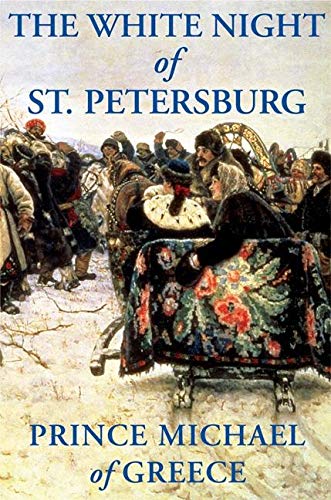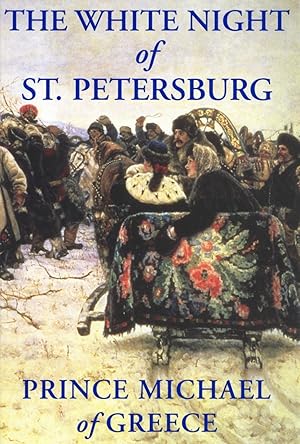philip franklin prince michael greece (2 résultats)
Type d'article
- Tous les types d'articles
- Livres (2)
- Magazines & Périodiques
- Bandes dessinées
- Partitions de musique
- Art, Affiches et Gravures
- Photographies
- Cartes
-
Manuscrits &
Papiers anciens
Etat
Reliure
- Toutes
- Couverture rigide
- Couverture souple
Particularités
- Edition originale (1)
- Signé
- Jaquette (1)
- Avec images (1)
- Sans impression à la demande
Pays
Evaluation du vendeur
-
The White Night of St. Petersburg
Edité par Grove/Atlantic, Incorporated, 2004
ISBN 10 : 0871139227ISBN 13 : 9780871139221
Vendeur : Better World Books, Mishawaka, IN, Etats-Unis
Livre Edition originale
Etat : Good. First Edition. Former library book; may include library markings. Used book that is in clean, average condition without any missing pages.
-
The White Night of St. Petersburg
Edité par Atlantic Monthly Press, 2004
ISBN 10 : 0871139227ISBN 13 : 9780871139221
Vendeur : The Anthropologists Closet, Des Moines, IA, Etats-Unis
Livre
Hardcover. Etat : New. Etat de la jaquette : New. New tightly bound hardcover with like DJ. 8vo. Text is clean and free of marks or underlining. 335 pp. Fast shipping in a secure book box mailer with tracking. One morning in July of 1998, all the Romanovs still living assembled in the lobby of the recently renovated Astoria Hotel in St. Petersburg. They were waiting to attend the solemn burial of Tsar Nicholas II, his wife Alexandra and their children, murdered eighty years earlier, who were finally to be interred together. Prince Michael of Greece was there because his grandmother, Grand Duchess Olga, was a Romanov. She left Russian at sixteen to marry George I of Greece. While at the ceremony, Prince Michael spied a dazzling older woman on the fringes of the crowd and, curious to know her connection, traveled to Moscow to meet her. Her name was Natalya Androssov Iskander Romanov and over tea Prince Michael listened to the long-buried story of her grandfather, the Grand Duke Nicholas. To Prince Michael's utter surprise, the royal family had erased his existence from their official vaults. Natayla's memories are the only key to his past, and as she begins to tell Prince Michael her grandfather's story, the narrative fades to a snow-filled St. Petersburg morning in November of 1860. There begins a fantastic re-imagining of the life of this rebellious and dashing Duke. Young Nicholas idolized his mother Alexandra whom he declared the most beautiful woman in the world. She adored him just the same, and was proud of her son's beauty, his progress in school and his intelligence. At that time, though, custom dictated a separation between child and parent and the grand duchess was too conventional to break with the norm. Nicholas spent his days in the hands of a tutor, most of whom were a bit rough, but he and his beloved sister Olga happened to be in the hands of the frightful Mirbach. A man who couldn't be pleased, Mirbach's whippings left life-long scars on Nicholas's hips and back. And other than this, no one much looked after them. The young grand duke underwent military training and proved to be an extraordinarily gifted officer cadet. In 1868, on his 18th birthday, he was authorized to look after Pavlosk Palace, his favorite of his parent's estates, and which he would one day inherit. As a young man Nicholas gained quite the reputation as a ladies man and excellent lover, and Nicholas's aide-de-camp, Captain Vorpovsky, continually brought young dancers and prostitutes to Nicholas. Each time, he would show them the stunning portrait of the blue-eyed blonde princess Frederika von Hannover of Germany who rejected his offer of marriage. At this time, Nicholas's mother learns her husband has a mistress, and flees to the Pavlosk estate. Nicholas follows to comfort her, but she screams that it was his debauchery that inspired his father. From this point on, his relationship with his mother was never the same. Born Hattie Blackford, Fanny Lear was a young and devasting American beauty who left the States with marriage to a royal on her mind. She had sparkling eyes, a sensual mouth, and voluptuous frame and wanted to use these traits to follow in the footsteps of her role models--the courtesans La Castiglione, Lola Montez and her friend and mentor, Cora Pearl. One evening after arriving in Russia she receives an invitation to a formal ball at the opera. She goes tired and with little expectations, but catches Nicholas's eye. They hit it off instantly. Nicholas was truly in love with her, but even so he remained unfaithful, which broke her heart. One night she angrily fled to the home of her friend, Mabel Grey, where she met the young, powerfully attractive Count Nicholas Savine. They reconciled and left intolerably hot St. Petersburg for Pavlosk Palace, with Fanny in a beautiful dacha close by. He fell ill that summer and Fanny cared for him with great tenderness. Nicholas decided to take Fanny on a long trip through Western Europe, and asked for a leave of several months to restore his fragile health (he was suffering from syphilis). One day while strolling alone in a town near Vienna, Fanny came upon a lovely, secluded copse only to find Nicholas there with a young woman. Again they fought and reconciled in a pattern that defined their tempestuous relationship. To prevent news of the affair getting out, Nicholas's uncle sends him off to a military campaign in Khiva. He proves a brilliant military man, even saving the life and honor of his young and cowardly cousin. When back, Fanny encounters young Count Savine having dinner alone and encourages Nicholas to invite him over. Nicholas speaks of his desire for progress and democracy (beliefs his father shared to a lesser degree) and Savine urges Nicholas to meet with his radical friends. The three begin meeting together more often, and they meet once with Savine's young revolutionary friend, Sophie.Nicholas turns to stealing small items from his family's estates as a dare to compete with Savine for Fanny's approval. One night when all three are very drunk they invade his parents palace, and in the morning one of his mother's most precious diamond-stuuuuuudded icons is missing and an investigation begins. Loyal Voporsky confesses that Fanny gave him the icon to sell, and Fanny then tells Nicholas that Savine made her do it to pay for the revolution. Nicholas and Fanny are both imprisoned for the theft. Upon Fanny's release, the St. Petersburg police order her to leave Russia at once. When she arrives in Paris, hordes of journalists greet her begging for details of the scandal. News of the affair obviously overflowed Russia's borders, much to the royal family's dismay. As for Nicholas, in December 1874, Alexander II decrees that the grand duke Nicholas was suffering from a grave illness that necessitated special treatment, and then Nicholas's true fate became a state secret as his name vanished from the official court communiques. Rumors circulated furiously about Nicholas's cooperation with revolu.



